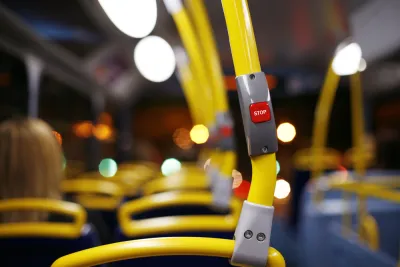As people re-evaluate their transportation decisions, the argument to support transportation demand management might not be what policy makers expected.

The Mobility Lab team wants transportation demand management (TDM) professionals to potentially reexamine the organizational goals and definitions of their work.
A post by Paul Mackie of Mobility Lab asks the question: "Would a common definition of the term and practice of transportation demand management help the industry find other funding sources, do better lobbying for policies, and gain wider acceptance and popularity?"
Mackie builds on the arguments from a presentation by Kirk Hovenkotter, a program analyst at TransitCenter and Mobility Lab contributor. According to Hovenkotter's argument, as described by Mackie, one of the primary sources of federal funding for TDM programs leads practitioners astray by focusing on ideas that don't reflect the preferences of users.
More specifically: "With 59 percent of funding for regional TDM programs throughout the country coming from the federal Congestion Mitigation and Air Quality (CMAQ) program, Hovenkotter said TDM organizations are somewhat forced to tailor their work to goals that are not Americans’ top priorities." The targets of the CMAQ program are in its name: traffic congestion and air quality.
Among the findings presented by Hovenkotter: "The top motivations for people [on their urban mobility choices] weren’t traffic congestion or environmental impact, but access to affordable, reliable, efficient transportation options."
The state of Oregon is the first to move away from relying on the TDM term in describing the benefits of such systems. Its statewide plan refers to its "transportation options" rather than transportation demand management.
FULL STORY: Rebranding “TDM” Could Fix the Industry’s Communications Struggle

Analysis: Cybertruck Fatality Rate Far Exceeds That of Ford Pinto
The Tesla Cybertruck was recalled seven times last year.

National Parks Layoffs Will Cause Communities to Lose Billions
Thousands of essential park workers were laid off this week, just before the busy spring break season.

Retro-silient?: America’s First “Eco-burb,” The Woodlands Turns 50
A master-planned community north of Houston offers lessons on green infrastructure and resilient design, but falls short of its founder’s lofty affordability and walkability goals.

Test News Post 1
This is a summary

Analysis: Cybertruck Fatality Rate Far Exceeds That of Ford Pinto
The Tesla Cybertruck was recalled seven times last year.

Test News Headline 46
Test for the image on the front page.
Urban Design for Planners 1: Software Tools
This six-course series explores essential urban design concepts using open source software and equips planners with the tools they need to participate fully in the urban design process.
Planning for Universal Design
Learn the tools for implementing Universal Design in planning regulations.
EMC Planning Group, Inc.
Planetizen
Planetizen
Mpact (formerly Rail~Volution)
Great Falls Development Authority, Inc.
HUDs Office of Policy Development and Research
NYU Wagner Graduate School of Public Service




























